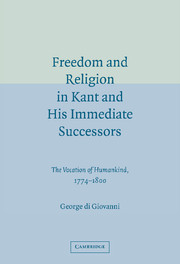Book contents
- Frontmatter
- Contents
- Preface
- Abbreviations
- 1 Introduction: The Vocation of Humankind, 1774
- 2 The Taming of Kant: Popular Philosophy
- 3 The Intractable Kant: Schultz, Jacobi, Reinhold
- 4 Of Human Freedom and Necessity
- 5 Kant's Moral System
- 6 The Difference That Fichte Made
- 7 The Parting of the Ways
- 8 The Vocation of Humankind Revisited, 1800: Conclusion
- Notes
- Bibliography
- Index
6 - The Difference That Fichte Made
Published online by Cambridge University Press: 24 July 2009
- Frontmatter
- Contents
- Preface
- Abbreviations
- 1 Introduction: The Vocation of Humankind, 1774
- 2 The Taming of Kant: Popular Philosophy
- 3 The Intractable Kant: Schultz, Jacobi, Reinhold
- 4 Of Human Freedom and Necessity
- 5 Kant's Moral System
- 6 The Difference That Fichte Made
- 7 The Parting of the Ways
- 8 The Vocation of Humankind Revisited, 1800: Conclusion
- Notes
- Bibliography
- Index
Summary
THE DEBATE ON FREEDOM, CONTINUED
Coming on the scene when it did, Kant's book on religion, and especially the original essay on radical evil incorporated within it, seemed to strike a blow against Schmid in support of Reinhold. Kant was now playing on the distinction between Wille and Willkühr, the faculty of will and that of arbitrary choice, on which Reinhold's position was based. Of course, Willkühr had merely anthropological meaning for Kant. The concept did not commit him to any transcendent claim. This is not, however, how Reinhold, quite understandably, read the essay in a self-congratulatory review of Kant's book. He took Kant to have seconded his position. As it happened, contrary to what he might have expected, Kant went out of his way only a few years later, in the Metaphysics of Morals of 1797, to deny that freedom can ever be defined as the faculty to choose indifferently between either conforming or not conforming to the moral law. In this denial, he was tacitly, but not any less obviously, taking aim at Reinhold. Confronted by this authoritative rebuff, there was nothing that the latter could do but vent his exasperation at what he took to be Kant's inconsistencies in a response he published that same year. By that time, Fichte already loomed large on the scene and had already captured more than a modicum of Reinhold's attention. In his response to Kant, Reinhold had borrowed concepts from the Wissenschaftslehre.
- Type
- Chapter
- Information
- Freedom and Religion in Kant and his Immediate SuccessorsThe Vocation of Humankind, 1774–1800, pp. 205 - 241Publisher: Cambridge University PressPrint publication year: 2005

